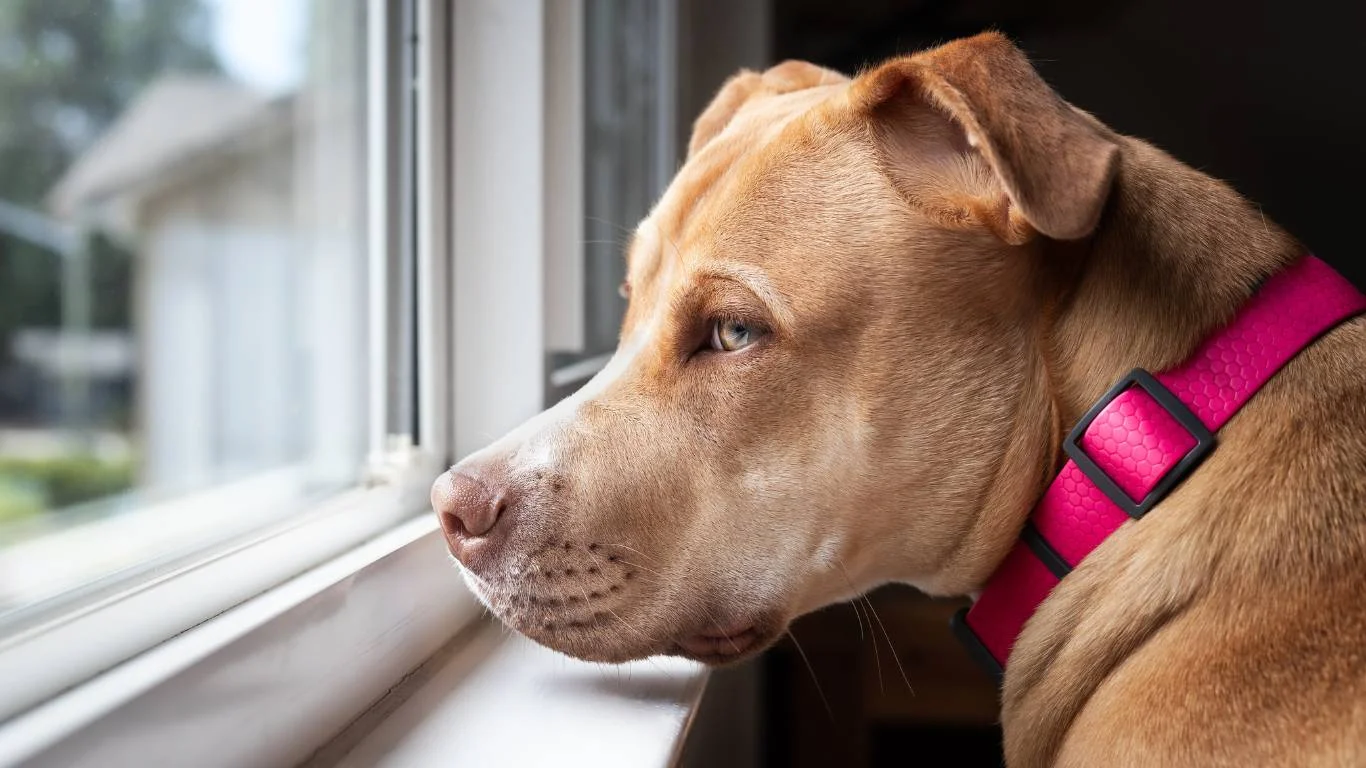Why Your Dog Might Yelp Randomly: Hidden Causes to Watch Out For
If you’ve ever been sitting on the couch, minding your business, and suddenly your dog lets out a yelp that makes you jump — you’re not alone. One of the most common questions I get asked in my role as a Veterinary Assistant with a focus on nutrition is: what causes a dog to yelp randomly? It’s a weird mix of alarming and confusing, especially when there’s no visible injury or scuffle happening. Trust me, I’ve seen plenty of concerned pet parents rush into the clinic because their pup let out a mysterious cry. Let’s dive into what could be going on when your furry friend surprises you with an unexpected yelp.
Physical Discomfort or Hidden Pain

Muscle Strains and Minor Injuries
Dogs are pros at hiding pain — it’s a survival instinct. But sometimes, a yelp slips out when they move the wrong way or put pressure on a sore spot. One time, I saw a senior Lab in our clinic who yelped every time he turned his neck. Turned out, it was a mild case of muscle strain from simply jumping off the couch wrong. It wasn’t something visible at first glance, but it caused enough discomfort to make him vocal.
Arthritis or Joint Sensitivity
Especially in older dogs or certain breeds prone to joint issues (looking at you, Dachshunds and Labs), that random yelp might be related to arthritis or joint pain. These dogs might not limp or whine all the time, but a sudden flare-up or a wrong movement can trigger a sharp yelp.
Back and Neck Problems
I can’t tell you how many times I’ve seen a small breed like a Chihuahua or Shih Tzu let out a squeal when picked up. The issue? Often something like IVDD (intervertebral disc disease), where their spine or discs are inflamed or compressed. It’s sneaky, but painful — and a surprise yelp is sometimes the first clue something’s wrong.
Neurological Causes and Nerve Pain

Pinched Nerves and Spinal Issues
Nerve pain hits different — literally. It’s sharp, sudden, and super uncomfortable. Dogs experiencing this kind of pain often yelp randomly, even when lying still. I once worked with a Yorkie who would randomly cry out, even while resting in her bed. After some gentle neuro exams and imaging, the vet diagnosed a pinched nerve along her spine. Once we started her on anti-inflammatories, the difference was night and day.
Seizure-Related Sensations
Another possibility (though less common) is that your dog may be experiencing mild seizure activity. This can include focal seizures where the dog seems otherwise normal but may yelp from an odd internal sensation. It’s spooky, but real. We always tell pet parents to watch for other signs like disorientation, twitching, or “fly-biting” behavior (where dogs snap at the air).
Emotional Triggers and Behavioral Quirks

Fear, Anxiety, or Startle Response
Just like people, dogs can be jumpy. Ever hear your dog yelp when a loud noise happens or someone surprises them? That’s not necessarily pain — it could be fear. I remember one particularly skittish Border Collie that yelped every time the toaster popped. It took us a while to figure out it was purely a noise-triggered fear response.
Past Trauma and PTSD
Dogs with a rough history (rescues, shelter dogs, or those from abusive situations) may yelp seemingly out of nowhere. It can be part of their trauma response. These dogs often need patience, a gentle environment, and sometimes the help of a behaviorist to feel truly safe.
Overstimulation
Believe it or not, even too much excitement can cause a yelp. I’ve seen pups squeal during play just because they got too revved up or accidentally nipped. It’s like a dog version of saying, “Hey! That was too much!”
How to Respond When It Happens
Stay Calm and Observe
First things first — don’t panic. Your dog takes emotional cues from you. If you freak out, they’ll freak out. Watch what your dog was doing right before the yelp. Were they jumping, stretching, eating, turning their head? Little clues like that can help a vet figure out the source.
Check for Obvious Signs
Run your hands gently along your dog’s body and look for flinching, swelling, cuts, or tenderness. Avoid pushing too hard. If they yelp when you touch a certain spot, stop and note it. This info can be gold when you visit the vet.
When to Call the Vet
- Yelping happens frequently or increases in intensity
- There are other symptoms like limping, loss of appetite, or lethargy
- Your dog seems unusually clingy, scared, or hides
Random yelping might be the first sign of something serious — or just a quirky reaction to a weird sensation. Either way, it’s worth taking seriously. And remember, you know your dog best. When something feels off, trust your gut and reach out to your vet.
Diet, Nutrition, and Gut Issues

Unexpected Belly Trouble
Let’s talk about food — because honestly, it plays a bigger role in yelping than most people realize. In my experience working with pets on tailored nutrition plans, I’ve seen dogs yelp due to tummy aches more times than I can count. A bloated belly or sudden gas pain can sneak up on them, especially if they’ve gotten into something they shouldn’t have (hello, trash can raids).
One Frenchie we worked with had random crying spells that left his owners stumped. Turns out, he was sensitive to certain fillers in commercial kibble. Once we switched him to a more digestible, limited ingredient diet, the yelps disappeared almost overnight. It was such a simple fix, but one most folks wouldn’t even think of.
Food Allergies and Sensitivities
Dogs with food allergies or intolerances often suffer in silence. Sure, you might notice itching or skin issues — but internal inflammation can also cause cramping or digestive discomfort, which may lead to random yelping. If your pup tends to vocalize after meals or looks uncomfortable while resting, consider this angle.
Dental Problems That Hurt More Than They Show

Toothaches and Oral Pain
This one’s sneaky. Dental issues often fly under the radar until they’re really advanced. A cracked tooth, inflamed gum, or lodged object between the teeth can all cause pain that sparks a random yelp. I’ve had dogs come in for unrelated reasons, only to yelp when we tried to examine their head — boom, we find a swollen gumline or fractured molar.
If your dog yelps when eating, chewing toys, or having their face touched, it’s time to peek in that mouth. Sometimes you can see redness or tartar buildup, but other times you’ll need your vet to take a closer look.
Jaw Discomfort or TMJ Issues
While less common, problems with the temporomandibular joint (TMJ) can also cause sharp, sudden pain. I saw a Boxer once who would yelp when yawning — after some digging, we discovered mild inflammation in his jaw joint. Softening his food and providing joint support supplements helped immensely. Not everything needs surgery or heavy meds — sometimes a tweak in care makes all the difference.
Skin Irritations and External Triggers

Fleas, Ticks, and Hidden Bites
Now here’s a classic — I had a little terrier mix who would let out the most dramatic yelp when a flea bit him. It wasn’t constant, just sudden bursts of barking or squealing, usually followed by frantic scratching. Once we got him on a proper flea control plan, problem solved.
Fleas, ticks, and even ant bites can trigger these kinds of surprise yelps. Check under their collar, around their tail, and in those armpit areas where pests love to hide. Just because you can’t see something right away doesn’t mean it’s not there.
Hot Spots and Skin Infections
Hot spots — those nasty, moist skin wounds — can hurt like crazy, especially when touched accidentally. A dog lying down or shifting on a sore spot might cry out and scare the heck out of you. It looks minor on the surface but hurts more than you’d expect. If your dog yelps when grooming or being pet, do a thorough skin check — especially under their fur.
Could It Be a Nighttime or Sleep-Related Issue?
Startling Awake
Just like us, dogs can have bad dreams. I’ve seen dogs yelp in their sleep or wake up howling. It’s unsettling, but often nothing to worry about if it’s rare. However, frequent episodes might hint at discomfort, anxiety, or even sleep disorders — yes, those exist in pets too.
Sleeping Positions and Nerve Pinches
Ever slept on your arm and woken up to pins and needles? Dogs can do the same — awkward sleeping positions sometimes lead to nerve pinches or sore muscles. A quick stretch or shift might cause that sudden “ouch” yelp as they work the kink out. If it’s a rare thing and they seem fine afterward, it might just be that.
Other Less Obvious Causes
Ear Infections or Sensitivities
This one’s often missed until the dog is really uncomfortable. If they yelp when you go near their ears, shake their head frequently, or tilt it to one side, you could be dealing with an ear infection or trapped moisture. Spaniels and other floppy-eared breeds are especially prone to this. Pro tip from the clinic: if it smells funky, it’s probably infected.
Vision Issues or Confusion
Dogs losing their eyesight — especially older ones — may yelp when startled or disoriented. I had a senior pug patient who would bark and yelp out of nowhere in dim lighting. He wasn’t in pain; he just couldn’t see where he was going and got scared. After we added nightlights around the house, his episodes dropped dramatically.
As you can see, what causes a dog to yelp randomly? is a question with many possible answers. The trick is observing the context, looking for patterns, and staying calm while you figure it out. From nutrition and dental pain to emotional triggers and subtle health issues, there’s a whole world of reasons behind that one little noise.
Hormonal or Metabolic Conditions

Thyroid Imbalances
Yep, hormones can mess with dogs too — just like us. Hypothyroidism, for example, is a sneaky culprit behind all sorts of weird behaviors and physical discomforts. I once worked with a Golden Retriever who had been yelping sporadically for weeks with no clear injury. After a full blood panel, we discovered his thyroid levels were way off. With the right meds, the yelping gradually stopped, and his energy came back.
Hormonal issues like these often come with other subtle signs: weight gain, lethargy, dry skin, or moodiness. They’re easy to overlook at first, but if your dog’s yelping seems paired with a dip in overall wellness, it’s worth getting checked out.
Diabetes and Related Discomfort
In diabetic dogs, pain from neuropathy or even spikes and drops in blood sugar can sometimes lead to sudden vocalizations. While less common, it’s something I’ve seen especially in senior pups or those with unmanaged diabetes. A comprehensive wellness exam is a must if your dog’s symptoms seem “off” but not clearly tied to a physical injury.
Environmental and Household Factors

Surfaces and Slips
Ever notice your dog yelps when walking across the kitchen tile but is totally fine on carpet? Hard surfaces can be a literal pain — especially for senior dogs or those with joint issues. Slips, slides, and awkward footing may lead to small jolts of pain, and that can trigger a quick yelp. We’ve had more than a few pet parents say the mystery cries stopped after they added a few rugs or runners through the house.
Hidden Hazards Around the Home
Things like exposed staples in furniture, sharp corners, or even small splinters from wooden decks have caused yelping episodes in some of the cases I’ve seen. One tiny Chihuahua I remember stepped on a thumbtack stuck in a rug. The poor thing yelped, jumped, and then limped for an hour before we found the culprit.
- Always do a quick floor check, especially in new spaces.
- Watch for wires, broken toys, or chewed-up sticks that could poke or scratch.
- Don’t forget outdoor areas — gravel, thorns, or even ice in winter can cause pain.
When It’s Time to See a Specialist
Why a General Vet Visit Might Not Be Enough
Sometimes, even after your regular vet gives the all-clear, that random yelping still keeps happening. This is where specialists come in — like neurologists, orthopedic vets, or behaviorists. I’ve referred more than a few “mystery yelpers” for further diagnostics like CT scans, MRIs, or detailed neuro exams, especially when all the obvious causes were ruled out.
One memorable case was a German Shepherd who would yelp and collapse suddenly — it turned out to be a form of cervical disc disease that wasn’t visible on standard X-rays. The referral to a neurologist literally changed her quality of life. After treatment, she was back to playing fetch like a puppy again.
How to Advocate for Your Dog
Don’t be afraid to push for more testing if something doesn’t sit right. You know your dog better than anyone. Keep a yelping diary — note time of day, what your dog was doing, what surfaces they were on, and any patterns. Vets love when owners bring detailed observations. It helps narrow things down way faster.
Preventing Future Yelping Episodes
Steps You Can Take at Home
- Update their diet – If you haven’t reviewed your dog’s food in a while, now’s a good time. Avoid cheap fillers and try a vet-approved formulation, especially for seniors.
- Supplements can help – Omega-3s, glucosamine, and probiotics have worked wonders in reducing discomfort and inflammation in many of our patients.
- Regular exercise (but not too much) – Daily walks, gentle play, and puzzle toys help with physical and mental health, which in turn reduces stress-induced yelping.
- Routine checkups – A vet visit once or twice a year (more for older dogs) helps catch problems before they get worse.
- Keep their environment safe – Use non-slip mats, avoid sharp furniture edges, and check for hazards regularly.
And Don’t Underestimate Emotional Wellness
Some dogs are just… sensitive. Emotional wellness matters. Enrichment, a stable routine, calm music, massage, and even anxiety wraps can all help keep your dog relaxed and reduce random vocalizations that stem from fear or tension. I always tell my clients, a happy dog is a quiet(er) dog — most of the time.
Final Thoughts on Random Yelping
So, what causes a dog to yelp randomly? As we’ve seen, it could be anything from a minor skin irritation to something deeper like spinal issues or emotional distress. The key is to observe, investigate, and when in doubt — ask for help. There’s no shame in not having all the answers. That’s what your vet team is for, and believe me, we’d rather see your pup early than after things have escalated.
When I reflect on the many dogs I’ve worked with over the years, the common thread is this: every yelp tells a story. You just have to be patient enough to listen.
References
- American Veterinary Medical Association
- American Animal Hospital Association
- VCA Animal Hospitals
- ASPCA – American Society for the Prevention of Cruelty to Animals
Disclaimer
This article is for informational purposes only and is not a substitute for professional veterinary advice, diagnosis, or treatment. Always consult your veterinarian or a qualified veterinary professional with any questions you may have regarding your pet’s health or behavior.






